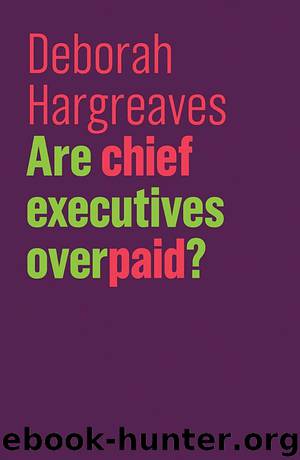Are Chief Executives Overpaid? by Deborah Hargreaves

Author:Deborah Hargreaves
Language: eng
Format: epub
ISBN: 9781509527793
Published: 2018-11-20T00:00:00+00:00
It’s not all about money
This fits in with other research on executive pay, suggesting that highly-skilled people in positions of key responsibility, already well-paid in comparison to wider society, are not motivated by the prospect of even more money. While greed is a factor in securing riches, many executives also look beyond the issue of more wealth.
The work of chief executives is unsuited to performance-related pay according to a recent article in the Harvard Business Review. It says that this sort of motivation is intrinsic: business leaders are doing it for satisfaction and a sense of achievement. On the other hand, when people are extrinsically motivated, they do things because they will receive greater rewards. ‘And when financial incentives are applied to increase senior leaders’ extrinsic motivation, intrinsic motivation diminishes.’8
Professor Alexander Pepper, who has looked into the behaviour of top executives and the way they are motivated, agrees. He says ‘intrinsic [i.e. non-pecuniary] motivation is a significant factor that drives executives.’9 Professor Pepper, along with his former employers at PwC, has surveyed executives around the world and found that they would be prepared to give up on average nearly 30 per cent of their income to work in more intrinsically satisfying jobs.
What really appears to motivate company executives is status. This is important for all of us – even students who are not yet in the world of work respond in similar ways to top bosses about the ‘perceived fairness of reward’. Most executives would prefer to receive a lower absolute amount of pay, provided that it compares favourably with their peer group, rather than a higher amount that leaves them badly-off compared to the peer group, according to research conducted by Professor Pepper. There are differences between executives in different countries, but these behavioural characteristics are largely universal and not affected by cultural factors.
Status seems to be a fundamental human motivation which, in fact, has little to do with money. It suggests that other, non-pecuniary ways of rewarding the well-paid could be equally effective in motivating them. There are some companies that have tried giving high-ranking employees rewards in the form of ringside seats to top sporting or theatrical events.
Other research by Professor Pepper also undermines the argument that top executives need ever bigger carrots dangled in front of them to improve their work ethic. He has found that executives ‘are much more risk averse than standard economic theory would suggest’. This means they value a ‘sure’ thing such as money more highly than a risky option such as the promise of a share award.
At the same time, ‘executives are very high time discounters’. This means that if they know they will not get their share award for another three years, they disregard its value. ‘This empirical evidence challenges conventional wisdom about the merits of high-powered incentive plans and pay for individual performance. It suggests that long-term incentives may actually be fuelling increases in executive pay, rather than helping to contain pay inflation.’
In other words, boards have made their
Download
This site does not store any files on its server. We only index and link to content provided by other sites. Please contact the content providers to delete copyright contents if any and email us, we'll remove relevant links or contents immediately.
The Secret History by Donna Tartt(16624)
The Social Justice Warrior Handbook by Lisa De Pasquale(11489)
Thirteen Reasons Why by Jay Asher(7788)
This Is How You Lose Her by Junot Diaz(5773)
Weapons of Math Destruction by Cathy O'Neil(5037)
Zero to One by Peter Thiel(4824)
The Myth of the Strong Leader by Archie Brown(4789)
Promise Me, Dad by Joe Biden(4447)
Beartown by Fredrik Backman(4419)
Stone's Rules by Roger Stone(4415)
How Democracies Die by Steven Levitsky & Daniel Ziblatt(4399)
The Fire Next Time by James Baldwin(4343)
100 Deadly Skills by Clint Emerson(4079)
A Higher Loyalty: Truth, Lies, and Leadership by James Comey(4033)
Rise and Kill First by Ronen Bergman(4012)
The David Icke Guide to the Global Conspiracy (and how to end it) by David Icke(3883)
The Farm by Tom Rob Smith(3872)
Secrecy World by Jake Bernstein(3782)
The Doomsday Machine by Daniel Ellsberg(3731)
